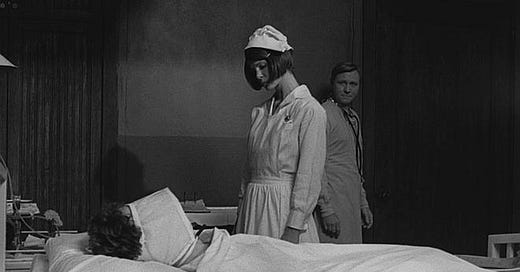Reeling Backward: Johnny Got His Gun (1971)
It's been said that every war movie is an anti-war movie, but I'm not sure that's true. "The Green Berets" is an overtly pro-war movie, with John Wayne making the case for American involvement in Vietnam. Even "Saving Private Ryan" and other films that extol the tremendous human cost of war do so through thrilling action scenes that are often as attractive as they are repulsive.
Dalton Trumbo's 1971 film "Johnny Got His Gun" is the epitome of a truly anti-war movie. Made during Vietnam but set during World War I, it looks contemptuously upon not only those two wars but all armed conflict between men. Old men are meant to sit at home and send young men to war to die, is the explicit message. Even the defense of democracy is something to be sneered at.
The protagonist is the ultimate figure of sympathy: An injured American G.I. Not only that, but he's injured so badly that almost no one would want to continue to live in his condition. But the Army doctors keep him alive as a way to help scientific research of traumatic injuries.
Joe -- played by Timothy Bottoms, in his very first film role -- has lost both his arms and both his legs, and even his face has been obliterated -- "scooped out" by an artillery blast, to use his words. He cannot talk, eat, smell, see or hear. In essence, he is a stump of flesh attached to a brain, but one which cannot communicate with the outside world. All he can do is move his head a little, and feel vibrations when someone walks into his room.
The thought of living like this is abhorrent to most people, including me. Unable to connect with the real world, Joe spends most of his time remembering his life, or dreaming, or a hallucinatory combination of the two. Joe has long conversations with his father (Jason Robards), who offers him some advice on his current predicament. He also gets some help from Jesus (Donald Sutherland), who chats with Joe and some of his fellow soldiers, who all seem to know how and when they will die.
Trumbo, who had one of the great screenwriting careers, also directed this film -- his only stint behind the camera. It's too bad, because he showed himself to be an able and imaginative director.
For instance, he makes the bold choice to portray all the present scenes in gauzy black-and-white, which lends them a somewhat dreamlike feel, while Joe's hallucinations are crisp and colorful.
The film plays out as something like a parable, with Joe as the pure and innocent who has been used shoddily by an uncaring world devoted to war and power. It would make a wonderful play, with Joe never emerging from beneath his mysterious tent of white hospital sheets and mask to hide his destroyed face.
(UPDATE: After writing this, I find that actor Ben McKenzie has done a stage version which is also being turned into a film.)
The military doctors keep Joe carefully locked away from the rest of the population, surmising that his condition would shock and anger other wounded soldiers. One nurse is sympathetic, though, and opens the shutters and strokes his forehead and unmarred chest tenderly.
"Johnny Got His Gun" isn't a film for everyone. It's not overtly violent or gruesome, but the horrid existence of this unfortunate young man is in some ways more disturbing than the goriest horror film. Such is war.
4 Yaps




